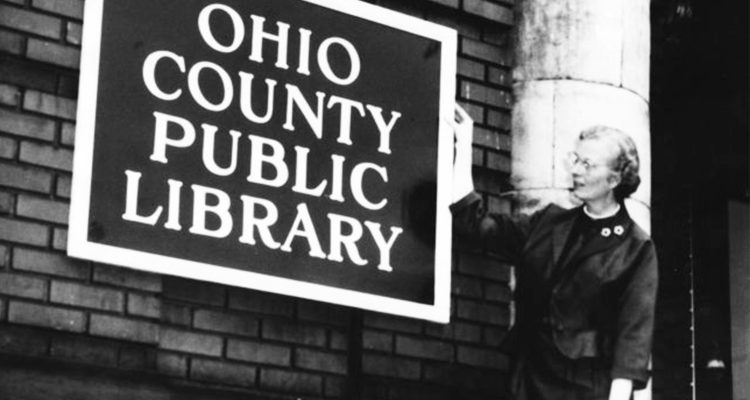Editor’s note: Throughout March — Women’s History Month — Weelunk will feature stories about women who have made history and women who are making history.
From the origins of the written word to today, women and books have been seen as a dangerous combination. Not only have women been prohibited from learning to read, they have also been warned to not read novels in particular (they corrupt the mind and body), and certainly, women sharing their love of books has been declared scandalous even well into contemporary times, especially in countries where women have limited rights.“Libraries are full of ideas — perhaps the most dangerous and powerful of all weapons.” — Novelist Sarah J. Maas
In fact, right here in West Virginia, women were once confined to the Trans-Allegheny Lunatic Asylum in Weston for, among other things, “novel reading.”
In 2016, a “Reasons for Admission” list circulated on social media. Although some readers thought of it as a joke, it is a very real list compiled from Weston’s records from 1864-1889. As with other “diagnoses” on the list, like “bad habits and political excitement,” these reasons were created as a means for controlling women. In effect, if women can read, then women can fight more effectively for what they want and need.
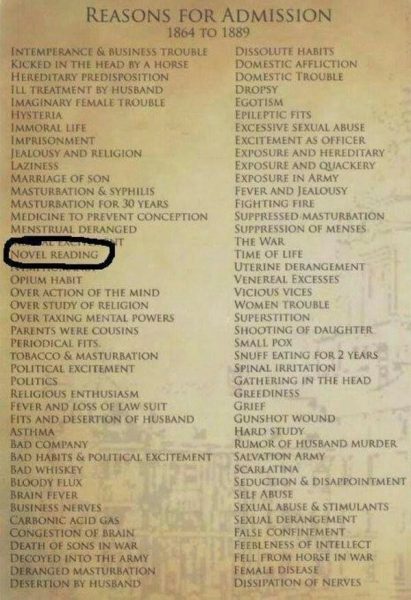
In contrast, women librarians, the actual holders of the keys to literacy, have been depicted in popular culture as stern older women who silence patrons with their dreaded “shush!” In reality, all bookish women should be seen as radicals in their fight for literacy and access to information for everyone. Why are these seemingly basic services radical? An educated citizenry is one that cannot be easily manipulated.
NELLE M. KRISE
Several such Wheeling women stand out in this aspect. Although not a librarian in the sense of shelving and checking out books, Nelle M. Krise, who taught English at West Liberty University from 1926-1966, collected and then donated books and other written materials to what would become the Nelle M. Krise Rare Book Room in Elbin Library.
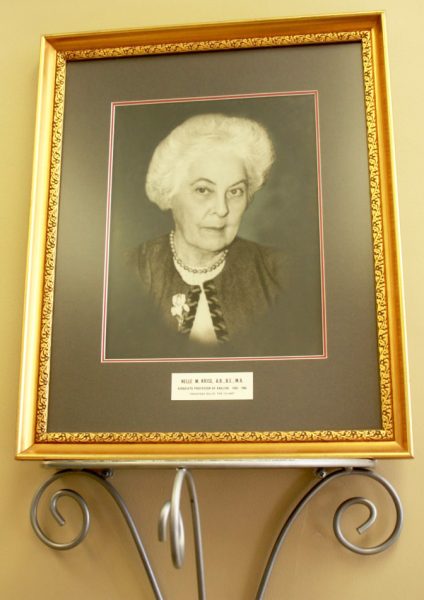
She never abandoned her quest for acquiring examples of the history of the written word, including a clay tablet receipt for sheep and goats from 2350 B.C., a papyrus fragment from 30 B.C. Egypt and a leaf of hand-blocked Chinese from the 12th century. The prize of Krise’s collection, a complete Dutch book of hours created around 1480, just returned from a $12,000 refurbishment at the Conservation Center for Art and Historic Artifacts in Philadelphia (CCAHA). This stunning illuminated medieval manuscript is one-of-a-kind and gives scholars and laypersons alike a look into the past. READ: WLU’s Rare Book Returns Home
Beyond her deep interest in collecting variations of the written word, Nelle Krise was a beloved English professor. Her students remember her fondly and give her credit for inspiring them to love reading. Former student Anna Brak Urich said, “She was an amazing woman. She absolutely loved books.”
Another West Liberty graduate, Karen Kuhn, noted, “I had Miss Krise for several classes in the 1960s. She had a unique style. Her book collection was famous even then. I learned so much in her classes. She was a student of Robert Frost and actually knew several poets. She made the poetry come alive.”
Krise, originally from Princeton, West Virginia, made her home in West Liberty for the academic year, but spent her summers and some winter breaks traveling abroad, especially to England. Given that she was paid significantly less than her male counterparts, it is astonishing that she was able to build such a unique collection and travel so extensively. While at West Liberty, she took a sabbatical to complete her master’s degree in Asian literature and brought her knowledge back to her students and colleagues on the Hilltop.
According to local newspapers, Krise regularly hosted Japanese tea ceremonies at her home, along with reading circles and other enlightening events.
To be such an outspoken advocate for reading and literacy for all, including a bunch of college kids in the hills of West Virginia, requires courage even today, but in the decades in which Krise taught, women were still sent to college for an “MRS.” — not a college degree.
Although college had become more accessible to the masses, including women, job opportunities remained limited for women. College, then, gave some women the opportunity to find husbands who were intelligent, motivated and likely, from well-off families. Imagine a woman like Krise inspiring men and women to see the world in different ways by her actions and her words. Her legacy remains at West Liberty University in the Rare Books Room in Elbin Library that bears her name and her collection of important manuscripts.
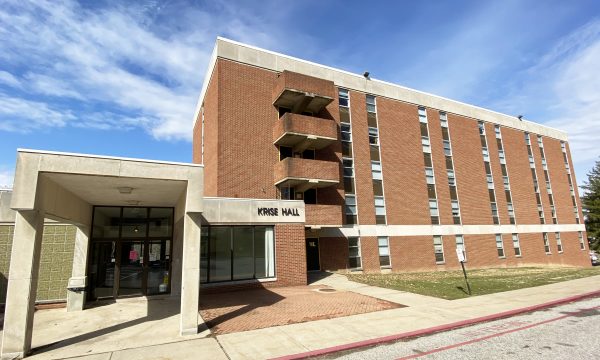
JEANNE SCHRAMM
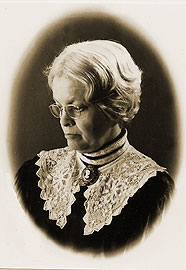
Jeanne Schramm served as a staff librarian at West Liberty University. Schramm was an active researcher and activist for women. In addition to working at the Elbin Library, Schramm was also a historical re-enactor. Over the course of her career, she gave more than 300 performances in seven states of women who changed history.
She portrayed Clara Barton at the Clara Barton Home in Glen Echo, Maryland, to mark the 100th anniversary of the founding of the American National Red Cross, Susan B. Anthony at the Bureau of Engraving and Printing in Washington D.C., and several other women whose defiance and courage altered history for all, especially women. By telling these stories in the women’s own words, Schramm raised awareness for their legacies and encouraged women of today to take a stand for what they believe in.
Along with her husband, long-time West Liberty professor Robert Schramm, she went on to collect historical artifacts from women’s history, specifically documents and photos from the women’s suffrage movement. Eventually, she and her husband converted a school bus into a traveling women’s history museum, which displayed a photograph and poem written and signed by Harriet Beecher Stowe, a letter on Red Cross stationery written and signed by Clara Barton dated the year of the founding of the American National Red Cross, an assortment of original woman suffrage posters, and so much more. In 2008, the museum’s exhibits became the first permanently installed collection in the National Women’s History Museum in Alexandria, Virginia.
Over the course of her life, Schramm, who now resides in a nursing facility in New York, demonstrated that books and writing and other artifacts should not only be preserved for future generations, but should be part of everyday life. These women came alive for her and through her, which helped guarantee that their accomplishments and struggles would not be forgotten.
VIRGINIA EBELING
Perhaps even more important than college librarians, public librarians and the libraries they serve provide incomparable value to their communities. While there have been many memorable librarians at the Ohio County Public Library in Wheeling, West Virginia, one stands out among the rest. Margaret Virginia Ebeling, who served as director of the OCPL from 1950 until her death in 1966, truly believed in the capacity of libraries as sites where knowledge is made available to all.
In her history of the library she concluded, “The future holds much in store for the library, which is the agency for keeping our citizens informed.”
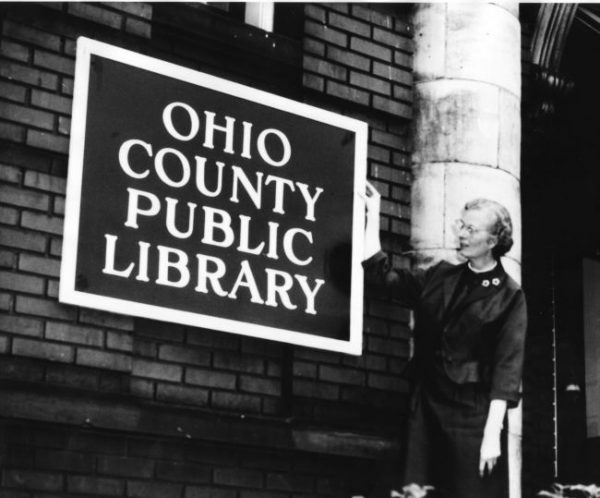
Before she served as the director of the OCPL, she was a cataloguer, researcher and general librarian. She also served as the president of the West Virginia Library Association and lobbied for a better library system throughout the state. Under her direction, the OCPL became a valued venue for Ohio Valley residents as noted in a 1961 letter to Stanley Hostler, labor education specialist at WVU: “In no other city in the state have I witnessed so many people utilizing their public library.” He and his team of students spent time conducting research at the OCPL. Further, he continued, “Many individuals do not realize that books are the basis of all learning.”
Ebeling not only served the people of Ohio County, but she willingly aided authors from across the country in finding everything from a previously unknown letter by Thomas Jefferson to photos of a crossing place on the Underground Railroad and circus performers from the 1890s. Her abilities as a researcher were renowned as was her love of history and the region. For example, Ebeling served as president of the Upper Ohio Valley Historical Society for a number of years.
During her tenure at the OCPL, she spearheaded and expanded programs offered by the library, including a film series, bookmobiles, reading and research rooms, and so much more. For Ebeling, the library was a place where the entire community could come together and share ideas and resources for free. Even today such a notion is a radical one. People who hold the reins of information hold the power.
Certainly, Ebeling’s unfettered ideas about what a library can and should be remain alive and well at the Ohio County Public Library today. Erin Rothenbeuhler, whose official title is web administrator at the OCPL, is well-known to library patrons, especially Wheeling history buffs. Rothenbeuhler is a local history specialist and knows the Ohio County Archives and Special Collections through and through. She also helps with programming at the library and writes for Archiving Wheeling.
From a distance, libraries and the librarians who work there might seem quiet and reserved. In reality, they are neither. As novelist Sarah J. Maas said, “Libraries are full of ideas — perhaps the most dangerous and powerful of all weapons.”


